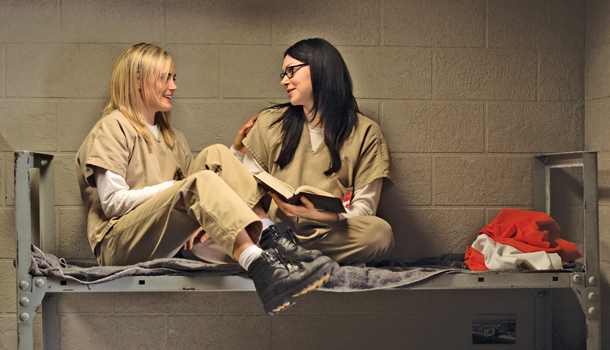
Review: ‘Orange Is the New Black: Season 3’
Queer women are in the spotlight in season three.
By David Goldberg
The cable antihero has gained luster over the past 15 years with the likes of Don Draper, Walter White, and Tony Soprano. Suffice it to say, they are all men, all drunks, and all depressing. But while they committed spousal abuse and cried over Scotch, show-runner Jenji Kohan was introducing the first of a wave of epic, dangerous women on her Showtime comedy Weeds. Over eight seasons, Nancy Botwin (Mary Louise Parker) transforms from pot-dealing suburban mom to drug kingpin, outlaw, and possible sociopath. With every lethal mistake Nancy made, Kohan asked: can a female protagonist be the villain of her own story? Based on audience response and the deluge of female stars flocking to TV for their own cable showcases, Weeds was on to something.
 In 2013, Kohan unveiled the latest privileged white woman to be thrown into danger with Orange Is the New Black’s Piper Chapman (Taylor Schilling), a Brooklyn yuppie who must serve time in a federal penitentiary for youthful drug smuggling. Once inside, Piper encounters women from an ocean of backgrounds, dealing with their own mistakes, circumstances, and ethical footing. An unprecedented armada of black, Latina, and LGBT women get the spotlight with flashbacks and monologues that reveal them to be more than just victims or perpetrators. With every episode, the series becomes a richer mosaic of personal perspectives. Weeds challenged us to accept the immorality of one white lady; Orange Is the New Black argues that no woman—regardless of her class, race, criminal history, or sexual orientation—can be judged, whether by an audience or a jury.
In 2013, Kohan unveiled the latest privileged white woman to be thrown into danger with Orange Is the New Black’s Piper Chapman (Taylor Schilling), a Brooklyn yuppie who must serve time in a federal penitentiary for youthful drug smuggling. Once inside, Piper encounters women from an ocean of backgrounds, dealing with their own mistakes, circumstances, and ethical footing. An unprecedented armada of black, Latina, and LGBT women get the spotlight with flashbacks and monologues that reveal them to be more than just victims or perpetrators. With every episode, the series becomes a richer mosaic of personal perspectives. Weeds challenged us to accept the immorality of one white lady; Orange Is the New Black argues that no woman—regardless of her class, race, criminal history, or sexual orientation—can be judged, whether by an audience or a jury.
After an epic, apocalyptic second season that pitted most of the cast against one another in a racial turf war, season three sees the women of Litchfield Penitentiary return to a status quo of individual survival, while the administration considers selling out to devious corporate overlords. Without as much of an overarching story, this season’s Orange patiently and responsibly follows its characters on personal journeys to seek meaning in a brutally meaningless system. Morello (Yael Stone) courts pen-pal fiancés, Flaca (Jackie Cruz) betrays her sisters for a career opportunity, and Black Cindy (Adrienne C. Moore) considers Judaism.
More than in the previous two seasons, season three pushes its queer women out of the role of sassy sidekicks and into active, complicated territory. In a standout episode called “Finger in the Dyke,” the resident butch badass, Big Boo (Lea DeLaria), considers faking a conversion to heterosexuality in order to receive donations from religious-right fanatics. In a series of stellar flashbacks, we learn that Boo has used her militant appearance to provoke confrontation about her lesbian identity; in her stubbornness to stand up for her own individuality, she refuses to compromise with her loved ones, and loses her mother without saying goodbye.
Laverne Cox’s Sophia finds herself at odds with the razor-sharp mother of the Latina gang, Mendoza (Selenis Leyva), when their sons form a friendship that leads to bad behavior. Sophia assumes that her child picked up violence, foul language, and misogyny from spending time in Mendoza’s low-income urban environment, but eventually must face the truth that her boy acts on his own, and that she must accept blame as his mother. The Latina community turns the prison against Sophia, which sparks a wave of horrific transphobic violence.
The role of Sophia has elevated Cox to the status of an icon, and she’s proven to shine as a champion for trans rights. But she fails to imbue Sophia with enough depth to make her anything more than a victim, and, when paired with the scene-skewering Leyva, her scenes often feel flat.
For most series, just featuring an LGBT character would seem like enough work on the show-runners’ parts, but Kohan and the writers of Orange move beyond inclusion and grant their lesbian and trans characters the chance to be dirty, vengeful, and even wrong. Big Boo and Sophia face hate for their gender and sexual identities, but they often use these signifiers to shield themselves from taking responsibility for their own failings. In letting them make mistakes, Kohan fully integrates Boo and Sophia with the other women.
Meanwhile, having lost faith in ever finding a welcome return to the safe, hetero-social outside world, Piper embarks on a Nancy-esque illegal business operation and quickly gives in to the power trip, fast spiraling from hapless outsider to stone-cold head honcho. After all the upheavals, lessons, and bonds Piper has experienced, is it possible that she will leave prison a worse person than the one she entered? Like the other women of the unit who make rough compromises for their survival, Piper’s story does not necessarily follow a traditional moral arc.
Not every story about prison ends with redemption, and not every woman should have to discover an innate goodness. Otherwise, they’d all be the same, and the constellation of identities and personalities on Orange Is the New Black wouldn’t shine so brilliantly.
Available May 17 from Lionsgate (lionsgate.com/tv/orangeisthenewblack).
David Goldberg is a frequent contributor to OutSmart magazine.











Comments